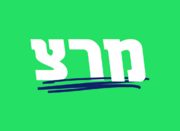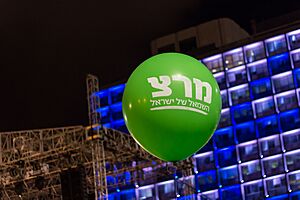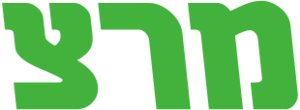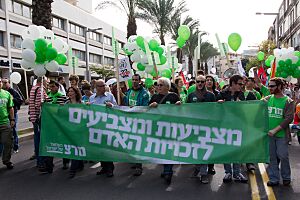Meretz facts for kids
Quick facts for kids
Meretz
מרצ
|
|
|---|---|
 |
|
| Leader | Zehava Gal-On |
| Chairman | Tomer Reznik |
| Founders | Shulamit Aloni Yair Tzaban Amnon Rubinstein |
| Founded | 1992 (alliance) 1997 (single party) |
| Merger of | Ratz, Mapam, Shinui |
| Headquarters | Tel Aviv |
| Youth wing | Meretz Youth |
| Ideology |
|
| Political position | Left-wing |
| National affiliation | Democratic Union (2019–2020) Labor-Gesher-Meretz (2020) |
| European affiliation | Party of European Socialists (observer) |
| International affiliation | Progressive Alliance Socialist International |
| Colours | Green |
| Knesset |
0 / 120
|
| Most MKs | 12 (1992–1996) |
| Election symbol | |
| מרצ مرص |
|
| Party flag | |
 |
|
Meretz (Hebrew: מֶרֶצ, Arabic: ميرتس) is a left-wing political party in Israel. The name "Meretz" means "vigour" or "strength." It was created in 1992 when three smaller parties joined together.
Meretz was most popular between 1992 and 1996. During this time, it held 12 seats in the Knesset, which is like Israel's parliament. However, after the 2022 elections, Meretz did not win any seats. This was the first time this happened since the party started.
Meretz is a social-democratic and secular party. This means they believe in a fair society where everyone has equal chances. They also think that religion and government should be separate.
The party strongly supports a two-state solution for the Israeli–Palestinian conflict. This means they believe in two separate states for Israelis and Palestinians. Meretz also focuses on social justice, human rights, and protecting the environment.
Contents
Meretz: A Political Party in Israel
How Meretz Started
Meretz began before the 1992 Israeli elections. It was formed by three left-wing parties: Ratz, Mapam, and Shinui. Shulamit Aloni, a long-time member of the Knesset, led the new party.
The name "Meretz" is a Hebrew acronym. It comes from the names Mapam and Ratz. The third party, Shinui, was mentioned in their campaign slogan. The slogan meant "A government with Meretz, the strength to make the change."
Early Success and Government Role
In its first election in 1992, Meretz did very well. They won 12 seats, becoming the third-largest party in the Knesset. Meretz then joined the government with Yitzhak Rabin's Labor Party.
This partnership helped lead to the Oslo Accords, which were peace agreements. Several Meretz members became government ministers. Shulamit Aloni, for example, became Minister of Education. Other members held important roles in energy, science, environment, and immigrant absorption.
Changes in Leadership and Mergers
After the 1996 elections, Meretz lost some seats. Shulamit Aloni stepped down as leader. Yossi Sarid took over. The three original parties officially merged into one party by 1997.
Some members of Shinui did not agree with the merger. They left to form their own independent party again.
Meretz in the 2000s
In 1999, Meretz regained some strength, winning 10 seats. They joined Ehud Barak's government. Yossi Sarid became Education Minister. However, Meretz left the government in 2001.
In 2002, Uzi Even became a Member of Knesset for Meretz. He was the first openly gay MK. His term was short, as new elections were called soon after.
For the 2003 elections, Meretz joined with another group called Democratic Choice. However, the party won fewer seats, only six. Yossi Sarid resigned as leader but stayed in the Knesset.
In 2003, Meretz decided to merge with another movement called Shahar. They first thought of naming the new party "Ya'ad," but changed it to "Yachad." This name means "Together" and also stood for "Social-Democratic Israel."
The goal was to unite groups that wanted peace in Israel. But not many groups joined. In 2005, the party changed its name to Meretz-Yachad. This was because people recognized the old name "Meretz" more. For the 2006 elections, they just used "Meretz" again.
In 2008, Haim Oron became the new chairman of Meretz. In 2008, Meretz also merged with another group called Hatnua HaHadasha.
Meretz from 2009 to Today
In the 2009 elections, Meretz and Hatnua HaHadasha won only three seats. Many left-wing voters chose other parties to try and get a different government leader.
After this, Haim Oron stepped down as chairman. In 2012, Zehava Gal-On was elected as the new chairman.
In the 2013 elections, Meretz won six seats. In 2015, Zehava Gal-On was re-elected as party leader. She initially thought about resigning after the 2015 elections, but Meretz gained a fifth seat, so she decided to stay.
Tamar Zandberg became the leader of Meretz in 2018. In 2019, Meretz held its first open primary election. This meant all party members could vote for their leaders.
For the April 2019 elections, Meretz won four seats. Later in 2019, Meretz joined a larger group called the Democratic Union. This alliance won five seats, with three going to Meretz.
Before the March 2020 elections, Meretz joined another alliance with the Labor and Gesher parties. This group won seven seats, and Meretz held three of them.
In the March 2021 elections, Meretz won six seats. They then joined a new government coalition. Three Meretz members became ministers: Nitzan Horowitz (Health), Tamar Zandberg (Environmental Protection), and Issawi Frej (Regional Cooperation). This was the first time Meretz was part of the government since 2000.
However, in the 2022 elections, Meretz did not win any seats. They missed the required number of votes by a very small amount. This meant the party no longer had representatives in the Knesset.
Meretz's Main Ideas
Meretz is a left-wing party in Israel. They are known for being social-democratic and Left Zionist. This means they believe in a strong social safety net and support the idea of a Jewish homeland that is also fair and equal for everyone.
The party also supports green politics, which focuses on protecting the environment. They believe in progressive and egalitarian policies, meaning they want society to move forward and for everyone to be treated equally. They also support secularism, keeping religion separate from government.
A key part of their platform is supporting a two-state solution for peace. Meretz is a member of international groups like the Socialist International and the Progressive Alliance.
Key Principles of Meretz
Meretz focuses on several important principles:
- Peace: They want peace between Israelis and Palestinians. This peace should be based on a two-state solution.
- Settlements: They want to stop building Israeli settlements in the West Bank.
- Human Rights: They work to protect human rights everywhere, including in the Israeli-occupied territories. They also fight against unfair treatment of minorities in Israel. This includes Israeli Arabs and foreign workers. They also support equal rights for all genders and LGBT rights.
- Social Justice: Meretz wants Israel to be a social-democratic welfare state. This means the government helps provide for its citizens' basic needs. They also protect workers' rights.
- Religious Freedom: They believe in separating religion and government. They also support religious freedom for all faiths, not just Jewish people.
- Security: Meretz cares about Israel's safety.
- Environment: They are strong supporters of protecting the environment.
Leaders of Meretz
| Leader | Took office | Left office | Knesset elections | Elected/re-elected as leader | ||
|---|---|---|---|---|---|---|
| 1 |  |
Shulamit Aloni | 1992 | 1996 | 1992 | |
| 2 |  |
Yossi Sarid | 1996 | 2003 | 1996, 1999, 2003 | 1996, 1999 |
| 3 |  |
Yossi Beilin | 2004 | 2008 | 2006 | 2004 |
| 4 |  |
Haim Oron | 2008 | 2012 | 2009 | 2008 |
| 5 |  |
Zehava Gal-On | 2012 | 2018 | 2013, 2015 | 2012, 2015 |
| 6 |  |
Tamar Zandberg | 2018 | 2019 | 2019 (Apr) | 2018 |
| 7 |  |
Nitzan Horowitz | 2019 | 2022 | 2019 (Sep), 2020, 2021 | 2019 |
| (5) |  |
Zehava Gal-On | 2022 | Incumbent | 2022 | |
How Leaders Are Chosen
When Meretz first started, Shulamit Aloni became leader by agreement among the founders. Later, the party began holding elections for its leader.
At first, only members of the Party Council voted. Then, delegates at the Party Convention voted. In 2004, the party opened the leadership vote to all its members. Over 15,000 members took part in that election.
Sometimes, the voting was limited to convention delegates again. But in 2018 and 2022, all party members could vote for their leader once more.
Election Results
| Election | Leader | Votes | % | Seats | +/– | Status |
|---|---|---|---|---|---|---|
| 1992 | Shulamit Aloni | 250,667 | 9.58 (#3) |
12 / 120
|
Coalition | |
| 1996 | Yossi Sarid | 226,275 | 7.41 (#5) |
9 / 120
|
Opposition | |
| 1999 | 253,525 | 7.66 (#4) |
10 / 120
|
Coalition (1999–2000) | ||
| Opposition (2000–2003) | ||||||
| 2003 | 164,122 | 5.21 (#6) |
6 / 120
|
Opposition | ||
| 2006 | Yossi Beilin | 118,302 | 3.77 (#9) |
5 / 120
|
Opposition | |
| 2009 | Haim Oron | 99,611 | 2.95 (#10) |
3 / 120
|
Opposition | |
| 2013 | Zehava Gal-On | 172,403 | 4.55 (#8) |
6 / 120
|
Opposition | |
| 2015 | 165,529 | 3.93 (#10) |
5 / 120
|
Opposition | ||
| Apr 2019 | Tamar Zandberg | 156,473 | 3.63 (#9) |
4 / 120
|
Snap election | |
| Sep 2019 | Nitzan Horowitz | Part of the Democratic Union |
3 / 120
|
Snap election | ||
| 2020 | With Labor and Gesher |
3 / 120
|
Opposition | |||
| 2021 | 202,218 | 4.59 (#12) |
6 / 120
|
Coalition | ||
| 2022 | Zehava Gal-On | 150,696 | 3.16 (#11) |
0 / 120
|
Extra-parliamentary | |
Knesset Members from Meretz
| Knesset term | Seats | Members |
|---|---|---|
| 1988–1992 | 10 | Shulamit Aloni, Mordechai Virshubski, Ran Cohen, David Zucker, Yossi Sarid (Ratz), Haim Oron, Hussein Faris, Yair Tzaban (Mapam), Avraham Poraz, Amnon Rubinstein (Shinui) |
| 1992–1996 | 12 | Shulamit Aloni, Ran Cohen, David Zucker, Yossi Sarid, Naomi Chazan, Binyamin Temkin, Haim Oron, Walid Haj Yahia, Yair Tzaban, Anat Maor, Avraham Poraz, Amnon Rubinstein |
| 1996–1999 | 9 | Naomi Chazan, Ran Cohen, David Zucker (left 17 March 1999), Yossi Sarid, Haim Oron, Walid Haj Yahia, Anat Maor, Avraham Poraz (left 17 January 1999), Amnon Rubinstein |
| 1999–2003 | 10 | Haim Oron (replaced by Mossi Raz on 25 February 2000), Hussniya Jabara, Zehava Gal-On, Naomi Chazan, Ran Cohen, Anat Maor, Amnon Rubinstein (replaced by Uzi Even on 31 October 2002), Yossi Sarid, Avshalom Vilan, Ilan Gilon |
| 2003–2006 | 5 | Haim Oron, Zehava Gal-On, Avshalom Vilan, Ran Cohen, Yossi Sarid |
| 2006–2009 | 5 | Yossi Beilin (replaced by Tzvia Greenfeld on 4 November 2009), Haim Oron, Ran Cohen, Zehava Gal-On, Avshalom Vilan |
| 2009–2013 | 3 | Haim Oron (replaced by Zehava Gal-On on 24 March 2011), Ilan Gilon, Nitzan Horowitz, |
| 2013–2015 | 6 | Zehava Gal-On, Ilan Gilon, Nitzan Horowitz, Michal Rozin, Issawi Frej, Tamar Zandberg |
| 2015–2019 | 5 | Zehava Gal-On (replaced by Mossi Raz on 22 October 2017), Ilan Gilon, Issawi Frej, Michal Rozin, Tamar Zandberg |
| 2019 | 4 | Tamar Zandberg, Ilan Gilon, Michal Rozin, Issawi Frej |
| 2019–2020 | 3 | Nitzan Horowitz, Tamar Zandberg, Ilan Gilon |
| 2020–2021 | 4 | Nitzan Horowitz, Tamar Zandberg, Yair Golan, Ilan Gilon |
| 2021–2022 | 6 | Nitzan Horowitz, Tamar Zandberg, Yair Golan, Ghaida Rinawie Zoabi, Issawi Frej (replaced by Ali Salalha on 18 July 2021), Mossi Raz |
| 2022–present | 0 | none |
Meretz Supporters Around the World
There are groups outside of Israel that share many of Meretz's ideas. These groups are connected to the World Union of Meretz. This union is a part of the World Zionist Organization.
Examples include Meretz UK in London and Partners for Progressive Israel in the USA. These groups help spread Meretz's message and goals internationally.
Hashomer Hatzair is a progressive Zionist youth movement. It has branches in many countries. This movement is informally linked with Meretz.
The American Jewish comedian Sarah Silverman even asked Israeli voters to choose Meretz in the 2015 election.
See also
 In Spanish: Meretz para niños
In Spanish: Meretz para niños
- Peace Now
- Young Meretz
- Meretz Youth
- Partners for Progressive Israel
 | Precious Adams |
 | Lauren Anderson |
 | Janet Collins |





